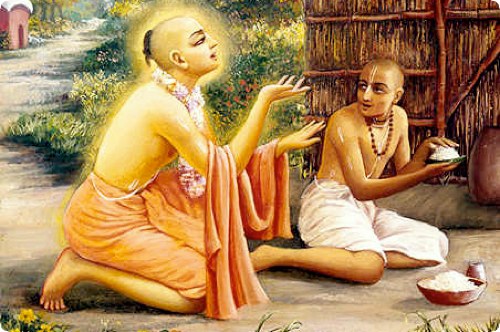Seminar on Vaisnava Etiquette and Culture given by HH. Bhaktividya Purna Swami given at ISKCON Radhadesa in 1998.
Author Archive
Vaishnava Etiquette and Culture by Bhakti Vidya Purna Swami – Part 1
Seminar on Vaisnava Etiquette and Culture given by HH. Bhaktividya Purna Swami given at ISKCON Radhadesa in 1998.
Understanding the principles, then details become clear.
So basically what we would like to discuss, with the blessings from the assembled devotees and Maharaja, is that in approaching or understanding the Sadhana or the culture of Krishna consciousness there’s some basic philosophical points on which it’s all based and by understanding those then the rest of it becomes quite easy. If one understands the principles, then the details underlining those principles become clear and very practical, because otherwise we get caught up in details and we think that the details is the important element. Details of course are important. (more…)
Learning the Etiquettes of a Devotee by Romapada Swami
Q. What is the significance of wearing Tulasi and tilok? Why should one fast in Caturmasya? Why do men wear shikas? Why should one offer food before eating it? [Editor's Note: Caturmasya is the four months of rain, from July to October]
Tulasi and Tilok: The way we dress ourselves has an influence on our consciousness. This is one of the reasons for wearing tulasi beads and tilok. For example, the meditation in wearing tilok is that one is marking one's body as the temple of God. So the devotee considers their body and the body of all others beings as a temple where God resides. We try to maintain that conception in all our activities. The tilok and tulasi neck beads remind of that fact, and those who see the devotee marked in this way are also reminded similarly. (more…)
Why are animals not allowed in the temple? by Romapada Swami
Q. It is said that animals should not be allowed in the temple. Do they not have souls? By going in the temple will they not get the blessings of Krishna? What really makes us different from them? How come we don't stop meat-eaters from coming into the temple? They too are considered to be like animals. I think this philosophy is wrong. On the one hand we say that one should not kill animals because we are all the same, everyone has a soul. But on the other hand the animals are not allowed to come into God's house. It is difficult to understand that we should treat them with respect and we should not harm or kill any living creatures, however animals are not allowed into the temple. Please explain.
Disciple should not sit on Guru’s asana by Romapada Swami
Q. The following quotations are in Scriptures, and GBC body has decided that Guru and Disciple should sit on same asana.
* The disciple should not sit with his spiritual master on same Asana. But one can sit with his guru on Bullock cart, Horse cart, Camel cart, Terrace of Palace, Straw mat, Rock and Boat.
* A disciple should not sit on the asana where his Guru sits and should not sleep on the bed where his Guru sleeps.
(more…)
Separation of men and women is desirable by Romapada Swami
Q. If the heart desires to sing praises to the Lord in a loud voice (especially during the day), should there be a consideration if female that there are no bramacharis around? I mean, is it wrong for a female to sing when there are bramacharis in the arena?
We are Vaisnavas and we are not concerned in one sense about bodily conception of male or female but yet the separation of men and women is desirable. Canakya Pandit said that every man should see all other women except one's wife as mother, and similarly a woman should see all men other than husband as sons. This kind of culture keeps everybody protected from unlawful desires.
(more…)
Attitude towards others by Romapada Swami
Q. Both in spiritual life and also in material life people speak of attitude. What should be the approach of a spiritual aspirants towards other spiritual aspirants and with materialists?
The answer to this can be found in a number of places, where qualifications of a madhyama adhikari are described. Amongst spiritual aspirants, there are those more advanced, those who are peers and those who are less advanced. In all cases, we should try to render service to the vaisnavas. Those who are more advanced, we should hear from them and serve them favorably. Amongst those who are peers, we should exchange realizations in the matter of spiritual understanding. With regard to those who are less advanced, we should try to extend ourselves in a helpful and compassionate way. (more…)
Vaishnava Etiquette by Jayapataka Swami


